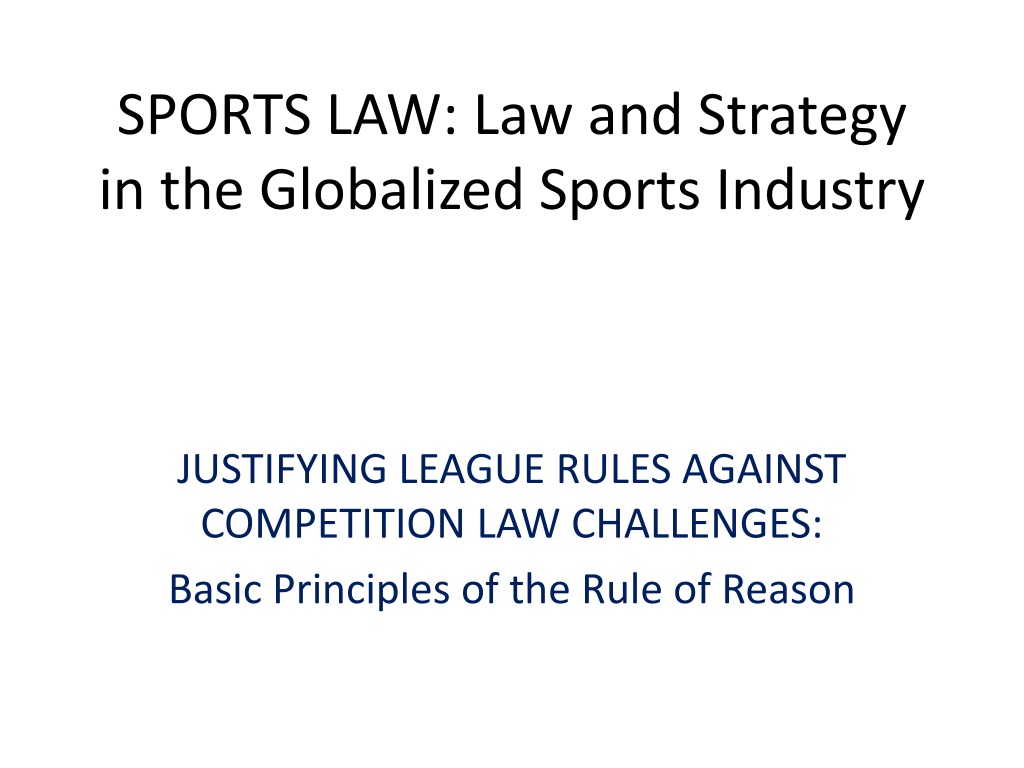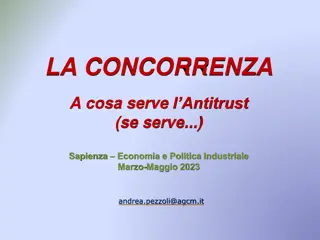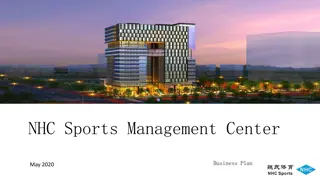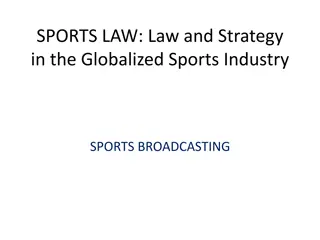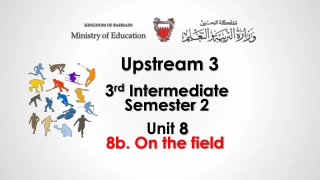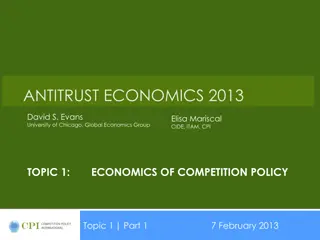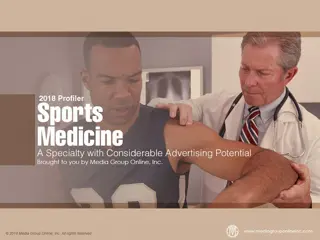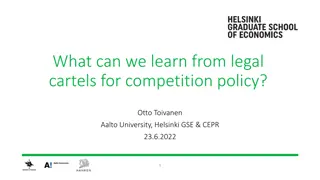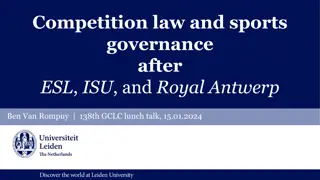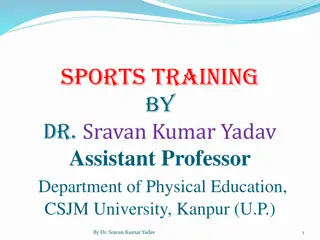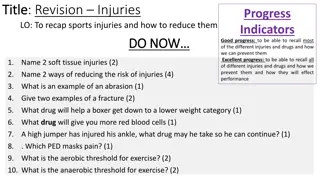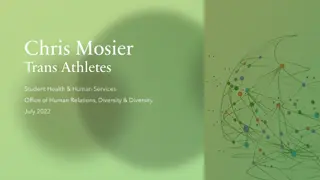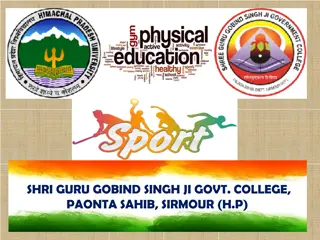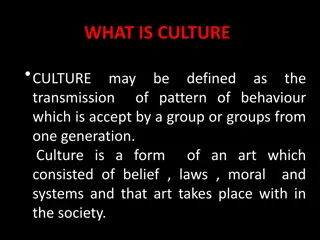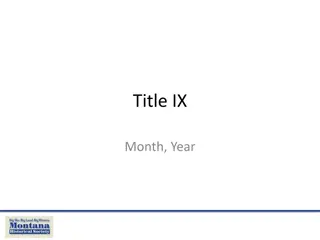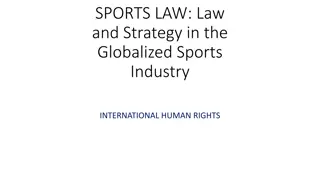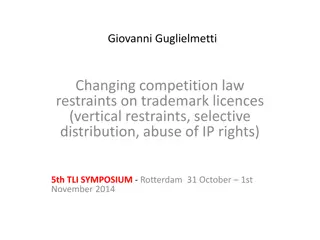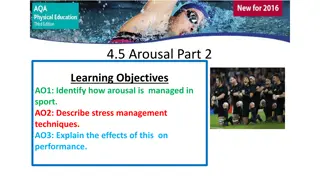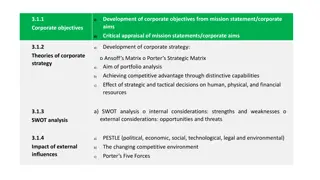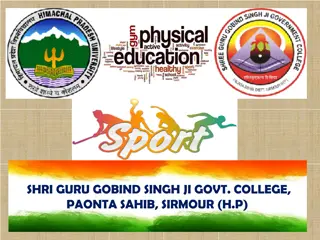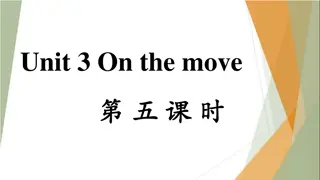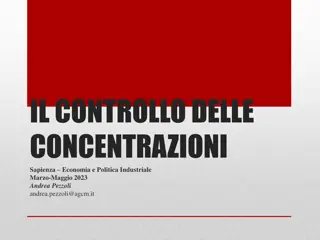Strategic Insights into Antitrust in the Sports Industry
Exploring the intersection of sports and antitrust law, focusing on justifying league rules against competition law challenges, the importance of legal counsel in strategic outcomes, policy foundations of competition, and the basics of antitrust in sports leagues.
Download Presentation

Please find below an Image/Link to download the presentation.
The content on the website is provided AS IS for your information and personal use only. It may not be sold, licensed, or shared on other websites without obtaining consent from the author. Download presentation by click this link. If you encounter any issues during the download, it is possible that the publisher has removed the file from their server.
E N D
Presentation Transcript
SPORTS LAW: Law and Strategy in the Globalized Sports Industry JUSTIFYING LEAGUE RULES AGAINST COMPETITION LAW CHALLENGES: Basic Principles of the Rule of Reason
Review and takeaway Finished discussion of sporting integrity Racial inclusion: declining participation because of need to pay to play Need infrastructure and incentive to train poor kids whose parents can t pay Public interest in social function of sport in underserved communities Personal conduct issues: beyond criminal law Offensive personal behavior Collective bargaining Line drawing
Strategic Importance of Antitrust for Legal Counsel Case studies provide insights into economic dynamics of sports, and dynamics of joint ventures generally Law as strategy: Use of antitrust as a sword to achieve strategic outcomes
Policy Foundation: Why Competition is Good and Monopolies and Cartels are Bad Multiple firms sell beverage sweeteners to beverage manufacturers Would it be in the public interest for a single firm to become the sole seller of beverage sweeteners? Would it be in the public interest to allow these rival sellers to agree to fix prices? What is the actual harm from these practices? Monopsony: suppose largest manufacturers all agreed to fix prices they would pay for beverage sweeteners?
Antitrust Basics: Per Se v Rule of Reason Certain pernicious activities are illegal per se : no need to show actual effect on competition because harm is presumed Price fixing by competitors Group boycotts to punish or exclude rivals Key non-sports precedents hold that price fixing is short-hand for naked trade restraints with no potential economic benefit Courts distinguish between vertical and horizontal agreements NASCAR agreement w/ race teams is vertical NCAA TV rules are horizontal
Application of Section 1 to Sports League Agreements: NCAA v. Board of Regents 1> Sherman Act only bars unreasonable restraints of trade 2> use Rule of Reason because this "involves an industry in which horizontal restraints on competition are essential if the product is to be available at all" 3> KEY R/R EXPOSITION: Price is higher and output lower than they would otherwise be, and both are unresponsive to consumer preference. - restraints reducing importance of consumer preference are inconsistent with antitrust laws 4> THUS: "these hallmarks of anticompetitive behavior place upon petitioner a heavy burden of establishing an affirmative defense which competitively justifies this apparent deviation from the operations of a free market"
The Rule of Reason Plaintiff establishes an actual anticompetitive effect Direct evidence = point #3 above re prices and output Indirect evidence = defendants have market power in a properly defined relevant market What other products can consumers find that are reasonable substitutes for the products in the purported market? (Here, court finds college football is the relevant market) Don t need proof of market power if naked restriction on price or output [262] Actual evidence that price/output unresponsive to consumer demand
Rule of Reason /2 Defendant establishes legitimate justifications Cost-saving or other efficiencies in joint action rather than individual freedom to compete: an agreement on price is necessary to market the product Strengthen ability to compete against rivals Training and development of young players Improve fan appeal (competitive balance) Illegitimate justifications Enhancing profits Use money for worthy causes Protecting products that cannot survive free competition Avoid competition that risks harm to social welfare (safety, defendant s conceptions of fairness)
Rule of Reason /3 Plaintiff can rebut by showing that challenge rule is not reasonably necessary or appropriately tailored to achieving legitimate purposes Note revenue sharing as alternative that entities typically reject in favor of direct restraints
Dynamics of Board of Regents Courts found [261] that if schools could sell TV rights, more games would be on TV Northwestern could generate more income in a free market with local games So why would NCAA vote for these rules? Cartel errors
Application of the Rule of Reason to Bd of Regents How would you apply the Rule of Reason to the NCAA s television agreement? Is the agreement anticompetitive? What are the NCAA s legitimate justifications? How would courts analyze similar restriction on US marketing of La Liga matches? Are these restrictions reasonably necessary?
Special Justifications for the NCAA? Goal is not profit maximization but the public good of a viable system of amateur athletics White J: absent restraints, a free market would not achieve this plan promotes promotion of amateurism and fundamental educational objectives [271] Specifically, reduces financial incentives toward professionalism Is this sufficient to justify differential treatment for the NCAA? Consider list of unchallenged restraints at pp267-8: these prevent competitively and economically successful programs from taking advantage of their success by expanding their programs, improving the quality of the product they offer, and increasing their sports revenues Is the TV plan any different?
Competition Challenges in EU 1. EU Treaty Art 101 bars agreements which have as their object or effect the prevention, restriction or distortion of competition 2. Competition law applies to commercial activities 3. Sporting Exception for non-commercial rules of the game But almost anything challenged HAS requisite economic activity 4. Distinct from US law is EU principle of free movement of workers 5. Construe in light of European Model of Sport
Rule of Reason in the EU Agreements only covered if the threaten free trade in a manner harming the objectives of the single market No violation if without restrictions the competition would not be possible at all: must be indispensable Role of revenue sharing as alternative to restraint
Dynamics and nature of rules Consider UEFA claim that need the transfer rules to compensate smaller clubs for cost of training If you were designing a rule to do so, what would it look like? Why would UEFA adopt a rule that bases compensation of player salary?
Judicial Review in Perspective Because most sports leagues have economic power, any many of their rules have some effect on output, key to application of antitrust law is the requirement that rules be justified Sports officials and their defenders object to having outside judges do this (e.g. German gov t in Bosman) Some sporting justifications aren t valid antitrust defenses, like preserving viability of lousy clubs with few fans Many sporting justifications are legitimate, but officials object to having judges second-guess their decision on which rules are reasonably necessary
Should antitrust apply to sports Should courts second-guess NCAA s view that too much television will hurt college football? Should courts second-guess UEFA s view that free transfers will Harm competitive balance? Defeat small clubs incentive to develop players? Error risk NCAA fan attendance if games on TV UEFA club support for non-citizens Create training for national team Fan loyalty v consumer loyalty TBD
Baseball Exemption (no assigned reading) Flood v Kuhn reaffirms in recognition and acceptance of baseball's "unique characteristics and needs" : 1) CONG AWARENESS AND 30 YRS INACTION: 2) BASEBALL DEVELOPED RELYING ON IMMUNITY 3) RETROACTIVITY PROBS W/ OVERRULING FED BASEBALL: 4) REMEDY SHD BE LEGISLATIVE Do these arguments persuade you?
